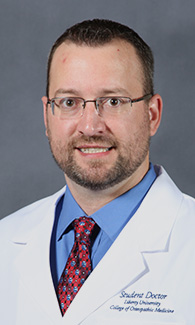Wednesday, October 14, 2015
LUCOM student-doctor guides peers with pediatric nursing experience
Wed, 14 Oct 2015Shelley Andrews :: LUCOM Marketing and PR
Thomas Rutherford remembers his first emergency department experience very well. He was five years old and needed stitches on his face.
 “The doctors put the drape on. They made my dad stay outside. To this day, the smell of that room, because I ended up working in that hospital, has an impact on me,” said Rutherford, second-year student doctor at Liberty University College of Osteopathic Medicine (LUCOM).
“The doctors put the drape on. They made my dad stay outside. To this day, the smell of that room, because I ended up working in that hospital, has an impact on me,” said Rutherford, second-year student doctor at Liberty University College of Osteopathic Medicine (LUCOM).
In a presentation organized by the LUCOM American College of Osteopathic Pediatricians (ACOP) on October 8, Rutherford talked to student-doctors about how to apply what they are learning in medical school in the real world, especially to future pediatric patients who are in pain.
“Their anxiety is always ratcheted up as soon as you walk in the door. Just by you being there, they are on edge,” said Rutherford.
Rutherford served nine years in the Air Force, has a master’s degree in nursing science and national certifications in clinical nursing and emergency medicine nursing.
He walked student-doctors through the importance of constantly re-assessing a child’s pain as well as how to get a child to self-report what they are feeling. For example, Rutherford says if a physician has to explain a pain scale more than twice, it may be too complicated for that child.
“With young children, they get into that mindset of: ‘is this the number they want to hear?’” said Rutherford.
Rutherford also discussed non-pharmacological interventions like music or distractions and the importance of working with parents and not against them.
“The emergency department has this mentality of: you stay on your side, I will stay on my side. There’s not a whole lot of working together,” said Rutherford. “Everyone has to be on the same page. If the child’s mom is freaked out, you have to have a chat with her beforehand.”
Rutherford concluded with a warning for student-doctors about becoming desensitized to patients who are feeling pain, which he says is common for emergency department doctors and nurses.
He ended the presentation with a quote from Louis Pasteur: “One doesn’t ask of one who suffers: what is your county and what is your religion? One merely says you suffer, this is enough for me, you belong to me and I shall help you.”